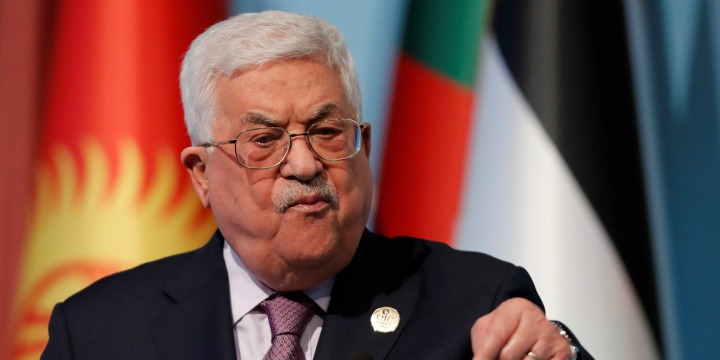Palestinian Leader Abbas Slammed Over Antisemitism, Holocaust Denial
 by Reuters and Algemeiner Staff
by Reuters and Algemeiner Staff
Israeli Prime Minister Benjamin Netanyahu accused Mahmoud Abbas of antisemitism and Holocaust denial on Wednesday after the Palestinian leader suggested in a speech that historic persecution of European Jews had been caused by their conduct.
Jewish groups and diplomats also condemned Abbas’ comments, made in a speech on Monday to the Palestinian National Council, that Jews had suffered historically not because of their religion but because they had served as bankers and money lenders.
“It would appear that, once a Holocaust denier, always a Holocaust denier,” Netanyahu said on Twitter.
“I call upon the international community to condemn the grave anti-Semitism of Abu Mazen (Abbas), which should have long since passed from this world.”
Abbas said in his speech that Jews living in Europe had suffered massacres “every 10 to 15 years in some country since the 11th century and until the Holocaust”.
Citing books written by various authors, Abbas argued: “They say hatred against Jews was not because of their religion, it was because of their social profession. So the Jewish issue that had spread against the Jews across Europe was not because of their religion, it was because of usury and banks.”
‘Classic anti-semite’
Responding to the Israeli criticism, chief Palestinian negotiator Saeb Erekat said Abbas’ words had been “twisted” and that he had been citing the views of some historians.
“The president did not deny the massacres the Jews were subject to, including the Holocaust,” Erekat said in a statement published on the official Palestinian news agency WAFA. “President Abbas has stressed frequently his respect for the religion of Judaism, and that our problem is with who occupies our land.”
But Jewish leaders and others echoed Netanyahu’s criticism.
“Abbas’ speech in Ramallah are the words of a classic anti-Semite,” said Marvin Hier and Abraham Cooper of the U.S.-based Jewish human rights organization the Simon Wiesenthal Center.
“Instead of blaming the Jews, he should look in his own backyard to the role played by the Grand Mufti in supporting Adolf Hitler’s Final Solution,” they added.
They were referring to Muslim Grand Mufti Haj Amin Husseini, a World War Two ally of Adolf Hitler, whose “Final Solution” led to the killing of six million Jews in Europe.
In Jerusalem, UN Middle East envoy Nickolay Mladenov called Abbas’ comments “deeply disturbing.”
“Leaders have an obligation to confront anti-Semitism everywhere and always, not perpetuate the conspiracy theories that fuel it,” he said.
US Ambassador to Israel David Friedman tweeted that Abbas had “reached a new low in attributing the cause of massacres of Jewish people over the years to their ‘social behavior.'”
German Foreign Minister Heiko Maas and the foreign service of the European Union, the biggest donor of aid to the Palestinians, also condemned the comments.
Abbas, 82, made his remarks in the West Bank city of Ramallah at a rare meeting of the Palestinian National Council, the de facto parliament of the Palestine Liberation Organization (PLO), which Abbas heads.
A veteran member of Fatah, the dominant faction of the PLO, Abbas served for decades as a loyal deputy of his predecessor, Yasser Arafat. He assumed the leadership of Fatah, the PLO and the Palestinian Authority after Arafat died in 2004.
Abbas was born in 1935 in Safat, a town in the north of what was then British-ruled Palestine. His family became refugees in 1948, fleeing across the border to Syria as violence intensified between Jews and Arabs, culminating in war between the newly-created State of Israel and its Arab neighbors in May 1948.
In 1982 Abbas obtained a doctorate in history at the Moscow Institute of Orientalism in the then-Soviet Union. His dissertation, entitled “The Secret Relationship between Nazism and the Zionist Movement”, drew widespread criticism from Jewish groups, who accused him of Holocaust denial.
 Iran Sentences Rapper Toomaj Salehi to Death Over 2022-23 Unrest
Iran Sentences Rapper Toomaj Salehi to Death Over 2022-23 Unrest Netanyahu: ‘Antisemitic Mobs Have Taken Over Leading U.S. Universities’
Netanyahu: ‘Antisemitic Mobs Have Taken Over Leading U.S. Universities’ U.S. Decides Against Sanctions on IDF’s Netzah Yehuda Battalion
U.S. Decides Against Sanctions on IDF’s Netzah Yehuda Battalion Israel Says It Is Poised to Move on Rafah
Israel Says It Is Poised to Move on Rafah Israeli Hostage Hersh Goldberg-Polin Seen Alive in a New Hamas Video
Israeli Hostage Hersh Goldberg-Polin Seen Alive in a New Hamas Video Palestinian Prime Minister Announces New Reform Package
Palestinian Prime Minister Announces New Reform Package France: Man Suspected of Abducting, Raping Jewish Woman ‘to Avenge Palestine’
France: Man Suspected of Abducting, Raping Jewish Woman ‘to Avenge Palestine’ Israel Intensifies Strikes Across Gaza, Orders New Evacuations in North
Israel Intensifies Strikes Across Gaza, Orders New Evacuations in North Iran Threatens to Annihilate Israel Should It Launch a Major Attack
Iran Threatens to Annihilate Israel Should It Launch a Major Attack ‘Completely Baseless’: Reports of Mass Graves at Gaza Hospitals are False, IDF Says
‘Completely Baseless’: Reports of Mass Graves at Gaza Hospitals are False, IDF Says




 Iran Sentences Rapper Toomaj Salehi to Death Over 2022-23 Unrest
Iran Sentences Rapper Toomaj Salehi to Death Over 2022-23 Unrest Israeli Hostage Hersh Goldberg-Polin Seen Alive in a New Hamas Video
Israeli Hostage Hersh Goldberg-Polin Seen Alive in a New Hamas Video Israel Says It Is Poised to Move on Rafah
Israel Says It Is Poised to Move on Rafah U.S. Decides Against Sanctions on IDF’s Netzah Yehuda Battalion
U.S. Decides Against Sanctions on IDF’s Netzah Yehuda Battalion Netanyahu: ‘Antisemitic Mobs Have Taken Over Leading U.S. Universities’
Netanyahu: ‘Antisemitic Mobs Have Taken Over Leading U.S. Universities’